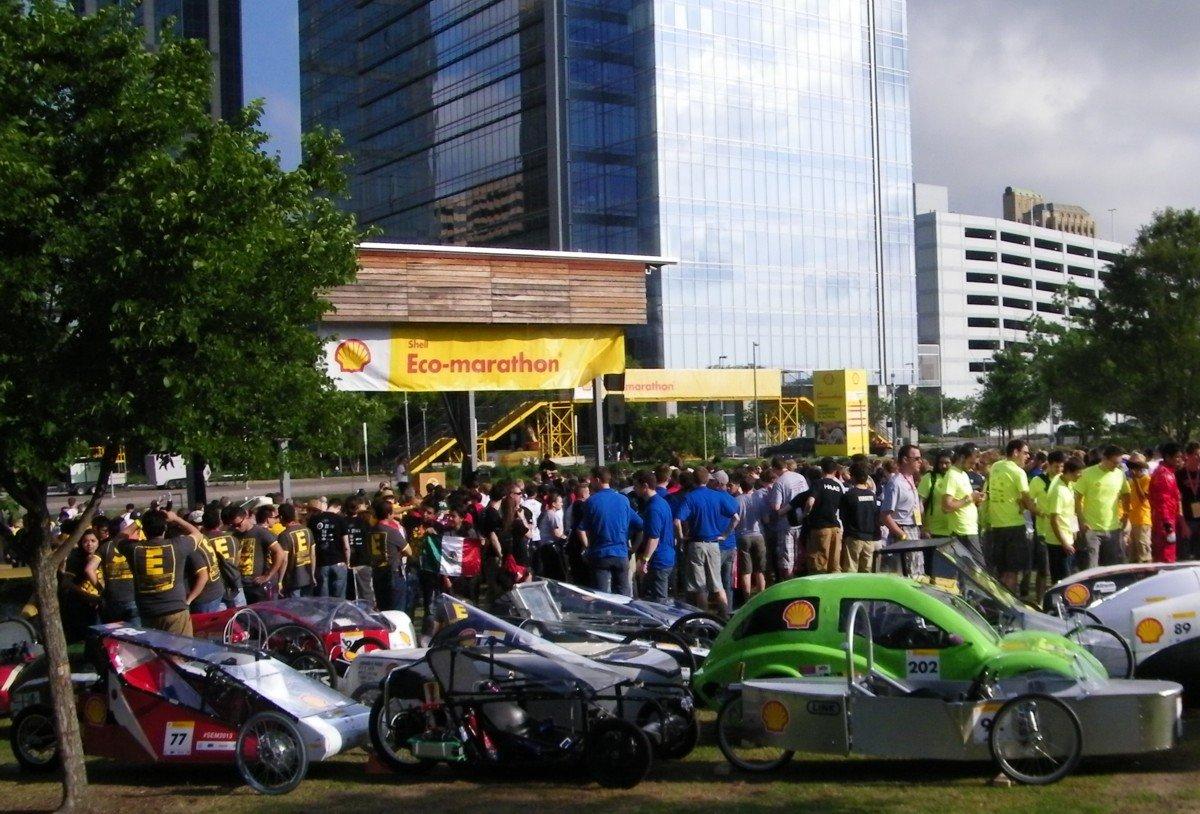
As I stood on the lawn outside of the George R. Brown Convention Center in downtown Houston, I knew I was about to see something special. I was listening to Houston Mayor Annise Parker talk about her city's track record when it comes to sustainability. Houston, the town through which one-third of all fossil fuel energy in the world passes, also gets more energy from renewable sources than any other city. Houston has hosted Shell's Eco-Marathon for the past five years. Next year it will be held in Detroit -- moving, in the words of Niel Golightly, Shell's VP of External Affairs, "from the capital of energy to the capital of mobility."
In front of me was a crowd of roughly 1,000 young people between the ages of 16-24, gathered in small clusters surrounding more than 120 futuristic-looking, very small cars, in various sizes, colors and shapes. Most of the cars were streamlined to one degree or another, many of them with a somewhat rough, homemade look that belied the fact that they were built entirely by the groups gathered so lovingly around them.
This was the official kickoff of the Eco-Marathon, an event with roots going back to 1939, when two Shell engineers made a bet over who could build a car with the best gas mileage. The winner that year achieved 49 mpg. The marathon became an annual event in 1985, first in Europe then, in 2007, moving to the Americas, then finally, in 2010, being replicated in Asia. Over time, the event migrated from a racetrack format to ordinary city streets, to more closely approximate real world driving conditions.
The cars are tiny, in most cases, one-seaters, and not something you'd want to be driving in around in on city streets. But all of these contest entries must submit to a rigorous safety inspection to avoid contestant injuries.
Today, there are two categories: prototype cars, that can be just about anything, and urban concept vehicles that are required to be a bit larger so as to more closely resemble something you might actually drive. As one might expect, the gas mileage record continues to be shattered, with the 2012 mark of 2,188 miles-per-gallon achieved by Mater Dei High School in the prototype category -- outpaced in 2013 by the Laval University team of Canada, who achieved 3,587 miles per gallon. In the urban concept category, the mark of 646.7 mpg achieved by Louisiana Tech in 2011, was outdistanced by the same Mater Dei High School, of Evansville, Ind., who achieved 849.2 mpg. These were all in the gasoline fuel category. Entries were also submitted in the five other fuel categories:ethanol, diesel, gas-to-liquid (GTL), hydrogen, and battery electric.
What was amazing to see was the dedication, commitment and enthusiasm of these young people, as they reached out to begin taking ownership of their own futures. The challenge was enormous--to approach the many facets of the problem ranging from vehicle weight, to propulsion technology, to electronic controls, to aerodynamics, to driving strategy and to squeeze the most out of each. What creative ideas might they come up with that has eluded engineers for years? The 126 registered teams represented five countries including, U.S., Canada, Mexico, Guatemala and Brazil. The 94 prototype vehicles consisted of 63 combustion type (including ethanol, diesel and GTL), and 31 electric (including fuel cell). There were also 32 urban concept vehicles.
This year's front-runner in the gasoline prototype category (at this writing) was another team from Laval University, which achieved a score of 2,823.6 mpg.
Stay tuned for a more in-depth look at the event and final results later this week.
Image credit RP Siegel
RP Siegel, PE, is an inventor, consultant and author. He co-wrote the eco-thriller Vapor Trails, the first in a series covering the human side of various sustainability issues including energy, food, and water in an exciting and entertaining format. Now available on Kindle.
Follow RP Siegel on Twitter.

RP Siegel (1952-2021), was an author and inventor who shined a powerful light on numerous environmental and technological topics. His work appeared in TriplePundit, GreenBiz, Justmeans, CSRWire, Sustainable Brands, Grist, Strategy+Business, Mechanical Engineering, Design News, PolicyInnovations, Social Earth, Environmental Science, 3BL Media, ThomasNet, Huffington Post, Eniday, and engineering.com among others . He was the co-author, with Roger Saillant, of Vapor Trails, an adventure novel that shows climate change from a human perspective. RP was a professional engineer - a prolific inventor with 53 patents and President of Rain Mountain LLC a an independent product development group. RP was the winner of the 2015 Abu Dhabi Sustainability Week blogging competition. RP passed away on September 30, 2021. We here at TriplePundit will always be grateful for his insight, wit and hard work.














